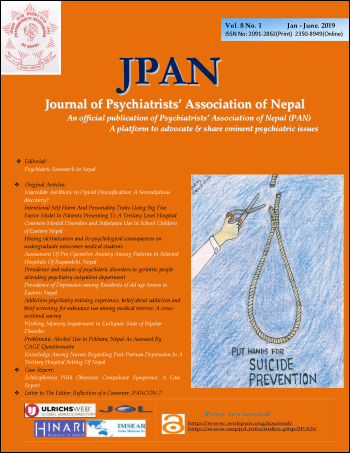Hazing victimization and its psychological consequences on undergraduate newcomer medical students
DOI:
https://doi.org/10.3126/jpan.v8i1.26332Keywords:
Hazing, Psychological Consequences, Newcomers, Medical studentsAbstract
Introduction: Hazing is a form of mistreatment received by the newcomers in a group which may have negative psychological consequences. The objectives of the study were a) exploring victimization of hazing in newcomer undergraduate medical students, b) determine the pattern of hazing with its psychological consequences and c) explore undergraduate students’ ways of coping.
Material And Method: It was a Cross-sectional study and a purposive sampling method was used. The total numbers of participants were 88. Data were collected in the third week of the session (January 2017). Instruments used were self-developed semi-structured questionnaire, General Health Questionnaire (GHQ), Depression Anxiety Stress Scale (DASS) and Ways of Coping Scale.
Results: Study revealed that newcomer medical students were hazed by their seniors in a group as well as individually. Hazing would last for less than one hour to more than two hours at a time and it was repeated more than four times a day. Dress code, an introduction of oneself, playing a fool, verbal abuse and sexual activities were the common types of hazing. Male students were victimized harsh than female and were also found more as caseness on the General Health Questionnaire and rated high on Depressive Anxiety Stress Scale. Commonly used ways of coping by newcomers were social support, positive reappraisal, self-controlling, distancing and accepting responsibility.
Conclusion: Students had very little or no control over hazing and as a result they experienced a high level of psychological distress which can have a significant impact on their mental health.
Downloads
Downloads
Published
How to Cite
Issue
Section
License
This license enables reusers to distribute, remix, adapt, and build upon the material in any medium or format, so long as attribution is given to the creator. The license allows for commercial use.




